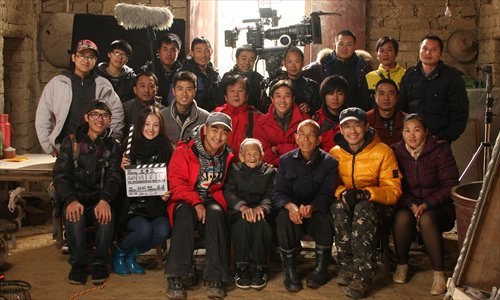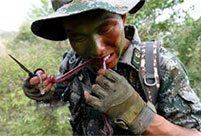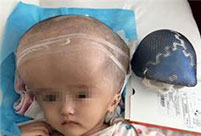

71 years ago, Wei Shaolan, who was captured and forced into sex slavery by the Japanese soldiers that invaded China, found herself pregnant with a Japanese troop's child after fleeing imprisonment in a "comfort station." Luo Shanxue, the half-Japanese boy she gave birth to a year later, has struggled for a lifetime with the stigma and shame given to him by his family and other villagers, and yet neither he or his mother has ever received an apology from the Japanese government.

Wei Shaolan (middle), her son Luo Shanxue and the crew of documentary Thirty Two, which tells their story. Photo: Courtesy of Guo Ke
Despite his age, Luo Shanxue, 70, has not given up hope that he will one day meet his biological father. "I will find him," he murmured. Suddenly, he raised his voice and gestured frantically, saying "He should be killed! He is not a human, but an animal!"
He is the son of Wei Shaolan, now 90, one of the 20-odd women who were the sex slaves of Japanese soldiers during World War II that are still alive in China.
Wei, from a village in Lipu county in Guilin, the Guangxi Zhuang Autonomous Region, was 20 years old when she and her 1-year-old daughter were captured by Japanese soldiers in 1944.
After spending three months confined in a local "comfort station," she managed to escape and ran back home. Shortly afterwards, diarrhea killed her daughter. Several months later in 1945, Luo was born, and Wei and her husband were certain that his father must have been a Japanese soldier.
And that label, being a descendant of a "Japanese devil," has been a stigma Luo has carried with him for his whole life. He has been the target of hatred and scorn from his neighbors - and his family - since childhood.
Painful memoriesDecades after the end of the war, Wei, now bent double and wrinkled, still remembers events vividly. In 1944, Japan launched a massive offensive, attempting to carve out a north-south inland supply route in China. With 400,000 soldiers, nearly half of their military manpower, they invaded Guangxi and in November, they occupied Lipu, according to Vista, a Chinese news magazine.
Along with the rest of their village, Wei's family hid in mountain caves to escape Japanese patrols. When there were no soldiers around, they would return to their homes.
One day when they were hiding, her mother-in-law, thinking it was safe, asked her to go home and feed their pigs. Before she reached the village, she was stopped by a Japanese soldier.
She was loaded onto a truck, along with five or six other women. They were taken to another side of the mountain and on the way, Wei saw another two women loaded onto the truck.
They were sent to the Maling "comfort station," about 20 kilometers away from her village. The ruins of the station are still standing today.
"We were locked in a room, and the devils would come in and rape us," Wei recalled in the 2012 documentary Thirty Two, a film about the lives of Wei and Luo. "Five or six devils each time, taking turns on two or three girls."
During their imprisonment the girls were given pills, Wei said. But she didn't know they were contraceptives. She thought the pills were toxic so she secretly stuffed them into cracks in her cell's walls.
One night, when the guards had become inattentive, Wei fled. As she wasn't sure which direction to take, it took her two days to make it home.
The reunion with her husband was unhappy after he learned of her suffering and that she was bearing a baby that was not his. Gossip and rumors about the pregnancy spread throughout their small community.
Her husband demanded she have an abortion. He relented after his mother, a herbalist, insisted that Wei would likely become infertile if she had an abortion.
Ten years later after Luo Shanxue was born, Wei gave birth to a daughter and in 1957 she gave birth to a son.
A lasting stigmaGrowing up, Luo knew he was treated differently from others. When his younger brother and sister enjoyed rice, he ate coarse cereals. Other children, and even his siblings, would call him "Japanese offspring." His father always gave him a cold shoulder.
But he dared not ask why, until he had a conversation with his uncle when he was 12. His uncle told him what Japanese soldiers had done to his mother. Luo finally understood when he saw a film about the Japanese invasion at school.
He understood why his father was reluctant to take him to see a doctor when one of his eyes had a problem, and why he was only sent to school for three years, while his siblings attended school for a much longer time. "It's because I'm not his child," Luo said.
The stigma of his parentage, in addition to his poverty and impaired sight, have led him being a life-long bachelor. Luo said he courted six girls but none decided to marry him.
"I wanted to get married, but there was no way," he said in the documentary. "When a girl agreed, her mother didn't agree." They believed having a half Japanese son-in-law would damage their reputation. "I have carried this stigma for a lifetime. It ruined my whole life," Luo said.
Luo's father died in 1986. Despite his father preferring his own biological children over him, Luo said he feels gratitude to the man that raised him.
"I'm very grateful for him. He only let me go to school for three years and made me eat coarse cereals, but they had no other choice, it was a bitter and poor time," he was quoted as saying by a recent report by the Legal Mirror.
Although he forgave his father, the barrier between him and his mother remains. Even though they live together under the same roof in a run-down house that's decades old, the two seldom talk with each other.
Family infightingAfter her daughter and youngest son married, Wei and Luo were the only two left at home.
After the local media reported on Wei in 2006, Luo Shanxue became the first nationally-known child of the Japanese wartime sex slavery system.
In 2010, Zhu Hong, an independent television producer who has long been concerned about the legacy of the Japanese invasion, reached out to Wei and Luo. He paid for them to go to Tokyo to participate in the 10th anniversary of the Women's International War Crimes Tribunal on Japan's Military Sexual Slavery.
Zhu Hong believes that Luo, as he is half Japanese, has the right to sue the Japanese government, which has declined lawsuits and requests from China on the grounds that, according to Tokyo, China gave up the right to pursue such claims in the 1972 Sino-Japan Joint Statement.
Despite efforts by individuals and legal experts who have helped former "comfort women" attempt to sue the Japanese government, none have succeeded.
According to Su Zhiliang, director of the China "Comfort Women" Issue Research Center at Shanghai Normal University, as Japanese courts have ruled that the "individual has no right to sue the State," all lawsuits lodged by Chinese "comfort women" have been in vain.
However, after Wei and Luo returned from Japan, Luo's brother believed that Wei had received compensation from Tokyo and had selfishly decided to keep it all for herself and Luo.
The two brothers started to argue. "Whenever he came home, he would quarrel and fight with me," Luo said.
Apart from what little money they make from raising and selling chickens, ducks and their eggs, the 500-yuan monthly subsidy the government gives to the mother and son is their only source of income.
Wei, who has heart diseases and liver tumors, has to spend a large part of their money on medicine.
Wei's daughter and son-in-law who live nearby sometimes ask them to dinner. Luo insists on grazing cows for their son, his nephew, as he hopes his nephew will care for him when he is too old to work.
No apologyThe Japanese government rejects the "comfort women" issue and its leaders and politicians have ignored repeated protests held in Japan and many other countries.
But efforts to claim compensation and apologies are ongoing. Although the exact number of "comfort women" remains unknown, researchers tend to agree that there were likely more than 400,000 women from East and Southeast Asian countries forced into sexual slavery by the Japanese military in WWII.
During a recent press conference, Oscar-winning Japanese animator Hayao Miyazaki, slammed Japanese Prime Minister Shinzo Abe and urged his country to clearly state its remorse over its treatment of the Chinese people.
Recently, a group of scholars from Indonesia, Singapore and Malaysia penned an open letter urging Abe to face up to Japan's wartime aggression and apologize to the victims, and compensate the surviving "comfort women."
The Chinese foreign ministry announced last year that it would submit documents about "comfort women" to the UNESCO Memory of the World, a project that aims to preserve documentary records of human history for future generations.
Many Chinese people are attempting to independently collect evidence of these atrocities before the remaining few victims of sex slavery pass away.
Guo Ke, the director of Thirty Two, is this week to debut his film Twenty Twowhich is about the 22 still-surviving "comfort women" in China.
He became interested in these women in June 2012 when he read a story about Wei Shaolan. In the following months, he paid three visits to Wei and made Thirty Two.
Although having suffered so much, Guo found that Wei still lives optimistically. "The way she faces her past and the positive attitude she has towards life impressed me very much. That's the bright part of her which deserves most respect," Guo told the Global Times.
Last year, he began to visit the 22 comfort women and record their stories.
Thirty Twohas been shown in China, the US, the UK, and Uganda. Guo said he tried to have the film shown at a Japanese film festival, but his application was rejected.
Never expecting to make a profit from the films, he said he plans to show Twenty Twofor free.
Global Times - Agencies
 Soldiers serving at Liaoning aircraft carrier
Soldiers serving at Liaoning aircraft carrier Bikini beauties lifeguards in river rafting place
Bikini beauties lifeguards in river rafting place PLA soldiers eat raw snake meat in harsh training
PLA soldiers eat raw snake meat in harsh training Doctors use 3D-printed skull to save girl
Doctors use 3D-printed skull to save girl Kiss contest held in Nanning, SW China
Kiss contest held in Nanning, SW China Yunnan-Myanmar Road: The past and present
Yunnan-Myanmar Road: The past and present Campus belle of Xiamen University gets popular online
Campus belle of Xiamen University gets popular online Who says moms cannot be trendy and hot?
Who says moms cannot be trendy and hot? Eight fruits that defend men's health
Eight fruits that defend men's health  Saffron-collar workers - a Buddhist break
Saffron-collar workers - a Buddhist break One-China should transcend Taiwan politics
One-China should transcend Taiwan politics Celebrity geeks: the worship of China’s top gaokao scorers
Celebrity geeks: the worship of China’s top gaokao scorers Higher state of being: Women practice yoga at 2,000 meters
Higher state of being: Women practice yoga at 2,000 meters Day|Week